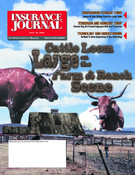Loren Parsons, president and CEO of agency management systems provider AMS Inc., thinks the small insurance agency market has yet to be tapped by companies that provide automation services to the insurance industry.
In a conversation with Insurance Journal at the AMS Users’ Group 26th National Conference in Dallas, Parsons, a 25-year veteran of the industry, asserted that of the 20,000 smallest agencies in the U.S. only about 20 percent are automated. “Certainly … we are not meeting the needs of small shops, and I think I understand why that is the case,” Parsons said. “There is a good number of small shops that don’t perceive the need for systems because the products they sell are all direct-built products [and] … the insurance company does the collection. And oftentimes, the insurance company provides service to those clients through their own service centers. The guy who offers things that way—all he really needs is some way to manage his prospect activity, and if it’s a one-man operation, he can probably do that on a piece of paper.”
He added, “There is probably a bigger segment of the small-sized agent market that could and would use a system if it weren’t so darned much work.”
In the high-end area, Parsons acknowledged that, “One of the top 100 agencies in the U.S. really isn’t automated at this point—I don’t quite comprehend why they’re not. The other 99 are all on some kind of an automation system.
“We’re very strong in the high-end market,” he continued. “I’m fairly certain we’re the leading vendor at that end. In the middle market we have a pretty strong stake, but [major competitor] Applied Systems has a bigger swath there. Combined, the two companies have, in the middle and high-end markets, a vast majority of the agencies installed with one of our systems.”
He noted that although AMS Services and other vendors are active in the small agency market, they have a long way to go. “If you look at who sells to small agents, there are two companies that hold almost identical positions.” Parsons said. “Dorus in Georgia is setting around 3,000 agencies on their system. As of October, we were around 3,100 agencies using our Prime product … There’s a third company that’s pretty active in small companies, but I suspect it has only about 1,000 customers … If you look at all three of us combined, we have less than half the small agents that are available out there.”
Parsons said simplification is the key to attracting small agencies. “I think there’s a lot of them still to be had and we’re working on simplifying systems—making it easier for people to exploit the technology. A small shop doesn’t have the luxury of taking people offline for two or three days to go through training, so you really have to simplify the system to the extent that the amount of training required to use it is less, and the amount of attention you have to pay to implement it is less.”
He said that new technologies could ultimately expand the appeal of agency automation, even to smaller shops. “There’s kind of a tendency for us to think, ‘Gee, we’re doing great, there’s no need to do anything,’ but … that’s incorrect. We need to keep pushing the R&D side to keep pace with technology. The ASP and .NET (platforms) offer an interesting opportunity for automation. .NET suggests that lots of folks who supply services—insurance companies, wholesalers, third party information providers—they could all play together with agency management systems pretty nicely if, in fact, agency management systems operate in a .NET environment.”
He suggested that over the next three to five years those new technologies would come into play. “I think we need to move in that direction,” Parsons added.
Was this article valuable?
Here are more articles you may enjoy.


 What Analysts Are Saying About the 2026 P/C Insurance Market
What Analysts Are Saying About the 2026 P/C Insurance Market  Insurance Broker Stocks Sink as AI App Sparks Disruption Fears
Insurance Broker Stocks Sink as AI App Sparks Disruption Fears  Zurich Insurance’s Beazley Bid Sets the Stage for More Insurance Deals
Zurich Insurance’s Beazley Bid Sets the Stage for More Insurance Deals  Maine Plane Crash Victims Worked for Luxury Travel Startup Led by Texas Lawyer
Maine Plane Crash Victims Worked for Luxury Travel Startup Led by Texas Lawyer 


